by Naomi L. | June 14, 2017 | Blog, Creative Writing |
Father’s Day is coming soon, so what else could I write about this week on my creative writing blog but the awesome dads in fiction? Fathers are among the most important family figures we know, and fathers in fiction can be just as influential to the other characters in their stories. There are plenty of well-known dads in literature, film, and television, but I finally managed to narrow this list down to a few of my favorites. They aren’t always perfect, but these lovable dads are still awesome parents!
So to celebrate this coming holiday, here’s a list of my five favorite fathers in fiction. Enjoy, and Happy Father’s Day!
1) Mufasa (The Lion King)
Look inside yourself, Simba. You are more than what you have become. You must take your place in the Circle of Life. – Mufasa’s spirit to Simba
 For those of us who grew up in the ’90s, the death of Mufasa in The Lion King was a defining moment in our childhoods. It was heartbreaking and tearjerking, not just because it was one of our first hard lessons about the tragedy and permanence of death, but because we witnessed a child lose his greatest mentor, role model, and friend.
For those of us who grew up in the ’90s, the death of Mufasa in The Lion King was a defining moment in our childhoods. It was heartbreaking and tearjerking, not just because it was one of our first hard lessons about the tragedy and permanence of death, but because we witnessed a child lose his greatest mentor, role model, and friend.
Through his brief time on screen, Mufasa imparts much of his wisdom to Simba (and the audience), teaching valuable lessons about the circle of life, the responsibilities that come with power, and the difference between courage and recklessness. Even in spirit, this wise and powerful king guides his son through the most difficult time in his life and encourages him to become the leader he was born to be. This great lion may not have lived through his movie, but to all us lifelong Lion King fans, his lessons have stayed with us since childhood and contributed to our understanding of the world as adults. It’s no wonder Mufasa is everyone’s favorite Disney dad!
2) King Fergus of DunBroch (Brave)
Princess or not, learning to fight is essential. – Fergus disagreeing with Elinor on Merida’s use of weapons
If I see myself in Princess Merida and my mother in Queen Elinor, I definitely see my father in King Fergus. The Bear King of DunBroch in Pixar’s Brave, Fergus is essentially the opposite of his wife: loud, easygoing, and hot-tempered. This polarity explains why Merida clashes so often with her mother while getting along so well with her father, as the king passed much of his personality on to his daughter. His views on the princess’s future are even more progressive than the queen’s; while it takes Elinor the length of the film to let go of tradition, Fergus believes from the beginning that Merida should be free to live her own life and make her own choices (even if he’s too anxious for household peace to bring it up).
Fergus has a great sense of humor and loves a good brawl, and while he doesn’t handle every situation ideally, his training and other contributions to Merida’s upbringing prove invaluable throughout the film, as the courage and fighting skills she inherited from him help her save her mother and lift the curse from her kingdom. Clearly, Merida is a strong and fierce young woman thanks to her equally strong and fierce father!

3) Mr. Bennet (Pride and Prejudice)
An unhappy alternative is before you, Elizabeth. From this day you must be a stranger to one of your parents. Your mother will never see you again if you do not marry Mr. Collins, and I will never see you again if you do. – Mr. Bennet after Mrs. Bennet tries to force Elizabeth to marry Mr. Collins
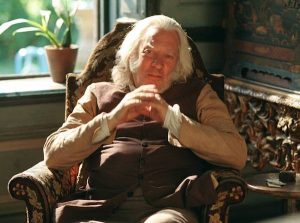 While he may not be winning any Father of the Year awards given that he totally neglected to leave his five daughters a proper inheritance, Mr. Bennet from Pride and Prejudice is still a pretty cool dad where it counts. He’s witty and sarcastic, which explains much of Elizabeth’s intelligence (she definitely didn’t get it from her mother!), and he has a delightfully cynical sense of humor, to the point where he delivers some of the funniest lines in the book.
While he may not be winning any Father of the Year awards given that he totally neglected to leave his five daughters a proper inheritance, Mr. Bennet from Pride and Prejudice is still a pretty cool dad where it counts. He’s witty and sarcastic, which explains much of Elizabeth’s intelligence (she definitely didn’t get it from her mother!), and he has a delightfully cynical sense of humor, to the point where he delivers some of the funniest lines in the book.
Unlike his wife, whose sole obsession in life is to marry her children off to wealthy gentlemen, Mr. Bennet is in no rush to see his girls get hitched, especially to people with whom they would clearly never be happy. After Jane, he’s the only other person Elizabeth can confide in for most of the novel, and if not the greatest role model for happiness, he at least has the sense to recognize his faults and warn the daughters who will listen not to make the same mistakes he did. Mr. Bennet isn’t nearly the greatest father in literature, but his cleverness and close relationship with Elizabeth make him awesome nonetheless!
4) Arthur Weasley (The Harry Potter series)
Yeah, Dad’s crazy about everything to do with Muggles; our shed’s full of Muggle stuff. He takes it apart, puts spells on it, and puts it back together again. If he raided our house he’d have to put himself under arrest. – Fred Weasley to Harry
 There are dorky dads, and then there’s Arthur Weasley. The patriarch of the Weasley family in the Harry Potter series, Arthur works in the Misuse of Muggle Artifacts Office in the Ministry of Magic, but he’s so enthralled by Muggle objects that he spends much of his time breaking the very laws he’s supposed to uphold by studying and enchanting said objects (the most notable example being the flying car Harry and Ron use to get to Hogwarts in The Chamber of Secrets).
There are dorky dads, and then there’s Arthur Weasley. The patriarch of the Weasley family in the Harry Potter series, Arthur works in the Misuse of Muggle Artifacts Office in the Ministry of Magic, but he’s so enthralled by Muggle objects that he spends much of his time breaking the very laws he’s supposed to uphold by studying and enchanting said objects (the most notable example being the flying car Harry and Ron use to get to Hogwarts in The Chamber of Secrets).
Aside from being eccentric, Mr. Weasley is a kind and laid-back wizard, a good father to seven children, and a strong advocate for Muggle protection. And while Harry does have a pretty cool godfather in Sirius Black, given all the time he spends with Ron’s family and all the hospitality they show him, Arthur is arguably the closest thing Harry has to a father figure throughout most of the series. He may be one of the dorkiest dads we knew growing up, but we Potter fans can’t help but love Arthur Weasley for his odd magical parenting skills and his heart of gold!
5) Marlin (Finding Nemo)
There, there, there. It’s okay, Daddy’s here. Daddy’s got you. I promise I will never let anything happen to you… Nemo. – Marlin to his only surviving egg
 Yes, Toy Story is a classic and I do write a lot about Brave, but if you ask me what my favorite Pixar movie is, I’ll definitely say Finding Nemo. Maybe I’m biased as a marine biologist, but as visually stunning as this film is, I find it especially appealing for Marlin and Nemo’s story and its depiction of the lengths a parent will go to for the love of a child. Sure, Marlin is far from the perfect father; he’s neurotic and overprotective, and at one point even tells Nemo he can’t do anything by himself. But can you really blame the guy for being so afraid of the ocean after losing almost his entire family to it?
Yes, Toy Story is a classic and I do write a lot about Brave, but if you ask me what my favorite Pixar movie is, I’ll definitely say Finding Nemo. Maybe I’m biased as a marine biologist, but as visually stunning as this film is, I find it especially appealing for Marlin and Nemo’s story and its depiction of the lengths a parent will go to for the love of a child. Sure, Marlin is far from the perfect father; he’s neurotic and overprotective, and at one point even tells Nemo he can’t do anything by himself. But can you really blame the guy for being so afraid of the ocean after losing almost his entire family to it?
Despite his flaws, this lovable clownfish turns out to be a great father where it counts; when Nemo is taken by divers, Marlin instantly overcomes his crippling terror of the “Big Blue”, facing fear after fear as he crosses the ocean to bring his kidnapped son home. The best part is that his adventure, Dory’s optimism, and Nemo’s bravery all help shape him into a much more relaxed and encouraging parent by the end of the movie, which really takes the strain out of his relationship with his son. As far as Disney dads go, Marlin is certainly one of the most devoted of the bunch!
Who are your favorite fictional fathers? What other fathers in fiction would you add to this list?
Dedicated to my dad and all the other amazing fathers out there! Thank you for all your love, wisdom, and support! Happy Father’s Day!
by Naomi L. | May 24, 2017 | Blog, Creative Writing, Off The Bookshelf |
Back in January, I finally returned to my Off The Bookshelf segment with a review of Jane Austen’s Pride and Prejudice. So today, I’d like to continue my reviews by writing about the other Austen novel I read last year. Since I’ve definitely been enjoying reading her literature, there was really only one novel I could review next: Sense and Sensibility!
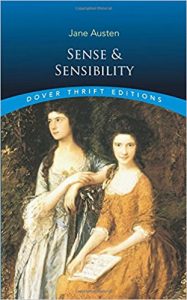
Sense and Sensibility, by Jane Austen
Summary
Sense and Sensibility was Austen’s debut novel, first published in London in 1811. The story follows sisters Elinor and Marianne Dashwood as they adjust to their new life with their widowed mother and younger sister, who have all been left impoverished after Mr. Dashwood’s death. Over the course of the narrative, the sisters experience love, romance, and heartbreak, and eventually come to realize that they must learn to master the delicate balance between sense and sensibility in order to achieve happiness.
Review
Though I wouldn’t say I liked it as much as Pride and Prejudice, I enjoyed Sense and Sensibility for Austen’s realistic take on romance and manners, seasoned with all her classic humor and wit. Much like in the author’s more popular novel, the main characters of this story are faced with the challenge of finding love in a world where their low income and social status put them at a severe disadvantage. What really sets this novel apart from its successor, however, is the comparison it draws between the tempers of Elinor and Marianne, who each occupy one extreme of the romance-realism spectrum.
As the title suggests, the most prominent theme in Sense and Sensibility is the contrast between good sense and overt sensitivity (known as sensibility back then). As the eldest Dashwood sister, Elinor has the best judgment in her family and is highly skilled at exercising good sense and composure. Her younger sister Marianne, on the other hand, has no control over her emotions and no desire to keep her overly sensitive demeanor in check, favoring romantic idealism over etiquette. This contrast between their personalities makes for several interesting situations throughout the story, but in the end both sisters learn the same valuable lesson: too much sense or sensibility only leads to unhappiness. Only after Elinor learns to open her heart to sensibility and Marianne learns to temper her spontaneity with sense do they both achieve their happy endings.
Another major theme in the book is the role of money and social standing in romance. Though her novels all have happy endings, Jane Austen was never one to tell an idealistic love story; in her view, even the truest love isn’t immune to the real-world obstacle of low income. In the most notable example, Marianne and Willoughby seem like a perfect match: they’re both romantic and outspoken about their opinions on art and love, and spend so much time together that everyone assumes they’re engaged before they even say a word. Unfortunately, being one of the author’s well-known “hero caricatures”, the charming Willoughby couldn’t be anything less than a scoundrel, and sure enough, his expensive tastes coupled with Marianne’s poverty lead him to jilt her for a wealthy young lady he doesn’t love. Funnily enough, the same obstacle of wealth turns out to be a saving grace for Edward Ferrars, who for most of the story finds himself honor-bound to a loveless engagement only to be saved at the end from said commitment by his disinheritance from his mother, leaving him free to give his heart to Elinor after his conniving fiancé abandons him. From beginning to end, wherever there are love and romance, the shadow of money looms in the background.
Overall, Sense and Sensibility is an enjoyable read that shows less-than-idealistic romance in a humorous light, as well as an interesting dynamic of character development between two polar opposite sisters. Just as Marianne learns from Elinor that excessive emotion can destroy one’s life, Elinor learns from Marianne that excessive repression of emotion leads to intense suffering and risk of abandonment. Still, in true Austen fashion, both sisters achieve their happy endings by the story’s conclusion, finding comfortable lives with gentlemen who can provide them with all the security and emotional fulfillment they desire. In this way, from her very first novel, the author reveals that despite all the realistic obstacles in its way, romance can still thrive in a world plagued with social barriers, a hope not yet forgotten in the modern age.
Inspiration
Much like Pride and Prejudice, Sense and Sensibility offers a glimpse into the romantic and realistic elements of past life that have survived into the present. The novel also teaches a valuable lesson on the importance of both practicing good sense and being willingly sensitive, albeit a somewhat imbalanced one that favors sense. We shouldn’t give our emotions total control over our happiness, but we also shouldn’t be afraid to feel vulnerable in the pursuit of love. There are plenty of opportunities in life to be both sensible and sensitive; it’s all a matter of exercising the right judgment.
Though her novels often highlight the limitations placed on women in the society of her day, Jane Austen clearly had a way of demonstrating the strength that women have always had to succeed within their means. Because of that, I know I can always turn to one of her novels for inspiration on writing heroines with real personalities, issues, and aspirations. Whether you seek inspiration for historical fiction, realistic characters, or contrasting themes in human behavior, Sense and Sensibility is an excellent novel that warrants a place beside Pride and Prejudice on any Austen fan’s bookshelf.
by Naomi L. | May 12, 2017 | J.C. Wolfe's Writing, Poetry |
I don’t know how you managed
To put up with me so long,
To endure my moody outbursts
As you taught me right from wrong.
I don’t know how you always
Knew exactly what to say
To help me through my problems
‘Til we made them go away.
I don’t know how you managed
To support me all those years,
To encourage all my dreams
And protect me from my fears.
But I’m thankful that you did it,
For without you there for me,
I could never be the person
That I always hoped to be.
So I thank you for your patience
To stick with me to the end,
And I thank you for your wisdom
As a mentor and a friend.
I thank you for your kindness,
A true blessing from above.
But most of all, I thank you
For your never-ending love.
To be an awesome parent
Is the most challenging task,
Yet you’re still the greatest mother
For whom anyone could ask.
I don’t know how you do it,
But I’m really glad you do.
Happy Mother’s Day to you, Mom!
Love, your daughter who loves you!
Happy Mother’s Day to my awesome mom! Thank you for all the love and support you’ve given me my whole life! I love you!
by Naomi L. | May 10, 2017 | Blog, Creative Writing |
Mother’s Day is this Sunday, and to mark the occasion, I thought it would be fun to share a list of some favorite moms in fiction! Mothers are undeniably among the most important figures in family dynamics, so it’s no surprise that fictional mothers also play a highly influential role in the lives of other characters in a story. There are so many famous mothers in literature, television, and film that it was hard to narrow this list down, but at last I managed to put together a post on the memorable moms in my favorite stories. They each have different strengths and weaknesses, but in the end, they’re all loving and dedicated parents!
So to celebrate the upcoming holiday, here is a list of my five favorite mothers in fiction. Enjoy, and Happy Mother’s Day!
1) Molly Weasley (The Harry Potter series)
NOT MY DAUGHTER, YOU BITCH! – Molly Weasley to Bellatrix Lestrange, whose Killing Curse had just narrowly missed Ginny
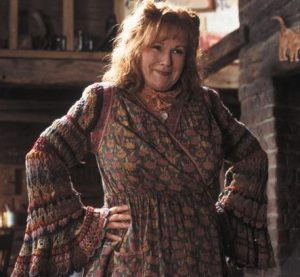 Molly Weasley, Ron’s mother in the Harry Potter series, may well be one of my favorite moms in all of literature. Not only has she raised seven children (and done a fine job of it too), but her maternal instincts are so strong that she extends her nurturing love to her youngest son’s best friends. Molly makes perfectly clear to Harry and Hermione that they’re always welcome in her home, and within moments of their first meeting, she quickly becomes to Harry the mother figure he never had growing up. Mrs. Weasley is proof that whether a witch or a Muggle, a mother will do anything for her children: while she runs a tight household and never hesitates to keep her mischievous sons in check, she is so fiercely protective of her children that she willingly steps between them and Death itself (namely Death Eater Bellatrix Lestrange) to keep them safe. The ideal mix of loving parent and badass witch, Molly Weasley is truly everyone’s favorite magical mom!
Molly Weasley, Ron’s mother in the Harry Potter series, may well be one of my favorite moms in all of literature. Not only has she raised seven children (and done a fine job of it too), but her maternal instincts are so strong that she extends her nurturing love to her youngest son’s best friends. Molly makes perfectly clear to Harry and Hermione that they’re always welcome in her home, and within moments of their first meeting, she quickly becomes to Harry the mother figure he never had growing up. Mrs. Weasley is proof that whether a witch or a Muggle, a mother will do anything for her children: while she runs a tight household and never hesitates to keep her mischievous sons in check, she is so fiercely protective of her children that she willingly steps between them and Death itself (namely Death Eater Bellatrix Lestrange) to keep them safe. The ideal mix of loving parent and badass witch, Molly Weasley is truly everyone’s favorite magical mom!
2) Margaret “Marmee” March (Little Women)
Don’t you feel that it is pleasanter to help one another, to have daily duties which make leisure sweet when it comes, and to bear and forbear, that home may be comfortable and lovely to us all? – Mrs. March to her daughters after their week-long “experiment” in being idle
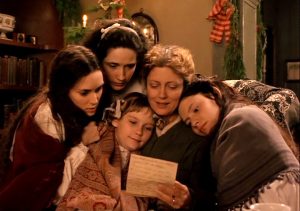 While Little Women centers on the various stories of four sisters growing up in 19th-century New England, it’s made clear in the beginning of the book that they all share a common aspiration: to live up to the example of their mother. Among women in classic literature, Mrs. March (known as “Marmee” by her daughters) is often held up as the image of the perfect mother: patient, compassionate, and highly principled. She works hard to support her family while her husband is at war, she cheerfully contributes to charity and the war effort, and she always has time to console her daughters no matter how busy she is. Yet Marmee does even more for her children by raising them all to be the best people they can possibly be, ensuring they’re all well educated and independent thinkers, encouraging them to marry for love instead of money, and always being there to offer them advice while still allowing them to learn from their own mistakes. With such a strong and loving mother to guide them, it’s no wonder the March sisters aspire to be such fine “little women”!
While Little Women centers on the various stories of four sisters growing up in 19th-century New England, it’s made clear in the beginning of the book that they all share a common aspiration: to live up to the example of their mother. Among women in classic literature, Mrs. March (known as “Marmee” by her daughters) is often held up as the image of the perfect mother: patient, compassionate, and highly principled. She works hard to support her family while her husband is at war, she cheerfully contributes to charity and the war effort, and she always has time to console her daughters no matter how busy she is. Yet Marmee does even more for her children by raising them all to be the best people they can possibly be, ensuring they’re all well educated and independent thinkers, encouraging them to marry for love instead of money, and always being there to offer them advice while still allowing them to learn from their own mistakes. With such a strong and loving mother to guide them, it’s no wonder the March sisters aspire to be such fine “little women”!
3) Queen Elinor of DunBroch (Brave)
Oh, my brave wee lass, I’m here. I’ll always be right here. – Elinor to a frightened young Merida
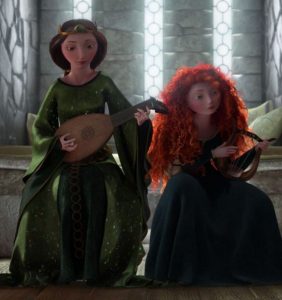 I’ve mentioned before that I often watch Brave and see my own relationship with my mother in Princess Merida’s relationship with hers. From the beginning of the film, Queen Elinor is determined to teach her daughter every possible lesson on proper princess behavior, from etiquette to diplomacy to compassion. Though at first it seems that her words never stick due to Merida’s strong will and stubbornness, it becomes clear toward the end of the story that no matter how many times they’ve butted heads over the years, Elinor’s wisdom did make an impression on her daughter after all. Merida mostly takes after her father on the outside, but it’s her mother’s lessons that help her calm the other royal families and ultimately get her through her trial. Elinor in turn also learns much about Merida throughout their adventure, enough to eventually shed her uptight persona and allow her daughter the freedom she’s always wanted to live her own life. A mother and daughter may not always see eye to eye, but the love between them is still one of the strongest bonds in the world!
I’ve mentioned before that I often watch Brave and see my own relationship with my mother in Princess Merida’s relationship with hers. From the beginning of the film, Queen Elinor is determined to teach her daughter every possible lesson on proper princess behavior, from etiquette to diplomacy to compassion. Though at first it seems that her words never stick due to Merida’s strong will and stubbornness, it becomes clear toward the end of the story that no matter how many times they’ve butted heads over the years, Elinor’s wisdom did make an impression on her daughter after all. Merida mostly takes after her father on the outside, but it’s her mother’s lessons that help her calm the other royal families and ultimately get her through her trial. Elinor in turn also learns much about Merida throughout their adventure, enough to eventually shed her uptight persona and allow her daughter the freedom she’s always wanted to live her own life. A mother and daughter may not always see eye to eye, but the love between them is still one of the strongest bonds in the world!
4) Lady Cora Crawley (Downton Abbey)
You are being tested. And you know what they say, my darling: being tested only makes you stronger. – Cora to Edith after the latter was left at the altar
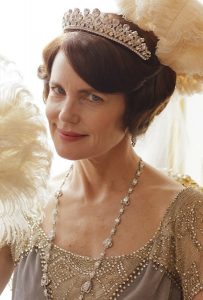 The Dowager Countess may be one of my favorite characters overall in Julian Fellowes’ popular period drama, but as far as mothers go, Lady Grantham probably sets the best example in Downton Abbey. Cora Crawley is the mother of three daughters, each with her own personality and aspirations, yet she always seems to know how best to handle each one—a difficult task given how the two elder sisters are always at each other’s throats. Generally sweet and willing to believe the best of anyone, Her Ladyship also proves to be a strong and highly capable woman: during World War I, she agrees to make Downton a convalescent home for recovering soldiers and works full-time to assist in running it, an experience that prepares her for her eventual position as President of Downton Hospital at the end of the series. She is quicker to embrace change than the rest of her family and is kind even to her servants, earning her immense respect among the staff of Downton. Overall, Cora is a loving motherly figure and, even as an American heiress and aristocrat in early 20th-century England, sets an exceptional example of a modern woman for her daughters!
The Dowager Countess may be one of my favorite characters overall in Julian Fellowes’ popular period drama, but as far as mothers go, Lady Grantham probably sets the best example in Downton Abbey. Cora Crawley is the mother of three daughters, each with her own personality and aspirations, yet she always seems to know how best to handle each one—a difficult task given how the two elder sisters are always at each other’s throats. Generally sweet and willing to believe the best of anyone, Her Ladyship also proves to be a strong and highly capable woman: during World War I, she agrees to make Downton a convalescent home for recovering soldiers and works full-time to assist in running it, an experience that prepares her for her eventual position as President of Downton Hospital at the end of the series. She is quicker to embrace change than the rest of her family and is kind even to her servants, earning her immense respect among the staff of Downton. Overall, Cora is a loving motherly figure and, even as an American heiress and aristocrat in early 20th-century England, sets an exceptional example of a modern woman for her daughters!
5) Mrs. Bennet (Pride and Prejudice)
When you have five daughters, Lizzie, tell me what else will occupy your thoughts, and then perhaps you will understand. – Mrs. Bennet to Elizabeth on why she thinks of nothing but marrying off her daughters
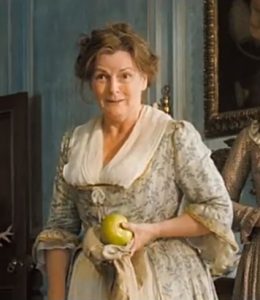 Yes, I know she’s not the best mother, or even a good mother on many counts, but given all the times she made me laugh, there was no way I could leave Mrs. Bennet off this list. Throughout Pride and Prejudice, Elizabeth’s father and younger sisters are embarrassing enough, but her mother proves by far the most humiliating of all. Foolish, noisy, and downright vulgar, Mrs. Bennet’s actions are solely driven by her desperation to marry her five daughters off to fine gentlemen, which often has the adverse effect of driving away the very suitors she tries to attract. Still, this simple woman provides much of the comedy in Jane Austen’s beloved novel, and for all the grief she gives her eldest daughters, she still manages to get what she wants in the end, gaining two wealthy sons-in-law and happy marriages for the most deserving of her children. She may go about it the wrong way, but readers can’t deny that her intentions, however misguided, are always good, even if just for a few laughs!
Yes, I know she’s not the best mother, or even a good mother on many counts, but given all the times she made me laugh, there was no way I could leave Mrs. Bennet off this list. Throughout Pride and Prejudice, Elizabeth’s father and younger sisters are embarrassing enough, but her mother proves by far the most humiliating of all. Foolish, noisy, and downright vulgar, Mrs. Bennet’s actions are solely driven by her desperation to marry her five daughters off to fine gentlemen, which often has the adverse effect of driving away the very suitors she tries to attract. Still, this simple woman provides much of the comedy in Jane Austen’s beloved novel, and for all the grief she gives her eldest daughters, she still manages to get what she wants in the end, gaining two wealthy sons-in-law and happy marriages for the most deserving of her children. She may go about it the wrong way, but readers can’t deny that her intentions, however misguided, are always good, even if just for a few laughs!
Who are your favorite fictional mothers? What other mothers in fiction would you add to this list?
Dedicated to my mom and all the other amazing mothers out there! Thank you for all your love, patience, and support! Happy Mother’s Day!
by Naomi L. | May 5, 2017 | J.C. Wolfe's Writing, Poetry |
To love someone intensely is to feel
Complete beside the person you adore.
When life gives you a love so pure and real,
You live each day to feel it more and more.
To love someone with all your heart and soul
Is finding one with whom to share your life,
So when your trials start to take their toll,
You’ll find peace with your husband or your wife.
To love someone forever is to know
The joy of having someone on your side.
No matter what you do or where you go,
You’ll always be together for the ride.
All that I’ve learned of love, you two taught me.
I love you! Happy Anniversary!
 For those of us who grew up in the ’90s, the death of Mufasa in The Lion King was a defining moment in our childhoods. It was heartbreaking and tearjerking, not just because it was one of our first hard lessons about the tragedy and permanence of death, but because we witnessed a child lose his greatest mentor, role model, and friend.
For those of us who grew up in the ’90s, the death of Mufasa in The Lion King was a defining moment in our childhoods. It was heartbreaking and tearjerking, not just because it was one of our first hard lessons about the tragedy and permanence of death, but because we witnessed a child lose his greatest mentor, role model, and friend.
 While he may not be winning any Father of the Year awards given that he totally neglected to leave his five daughters a proper inheritance, Mr. Bennet from Pride and Prejudice is still a pretty cool dad where it counts. He’s witty and sarcastic, which explains much of Elizabeth’s intelligence (she definitely didn’t get it from her mother!), and he has a delightfully cynical sense of humor, to the point where he delivers some of the funniest lines in the book.
While he may not be winning any Father of the Year awards given that he totally neglected to leave his five daughters a proper inheritance, Mr. Bennet from Pride and Prejudice is still a pretty cool dad where it counts. He’s witty and sarcastic, which explains much of Elizabeth’s intelligence (she definitely didn’t get it from her mother!), and he has a delightfully cynical sense of humor, to the point where he delivers some of the funniest lines in the book. There are dorky dads, and then there’s Arthur Weasley. The patriarch of the Weasley family in the Harry Potter series, Arthur works in the Misuse of Muggle Artifacts Office in the Ministry of Magic, but he’s so enthralled by Muggle objects that he spends much of his time breaking the very laws he’s supposed to uphold by studying and enchanting said objects (the most notable example being the flying car Harry and Ron use to get to Hogwarts in The Chamber of Secrets).
There are dorky dads, and then there’s Arthur Weasley. The patriarch of the Weasley family in the Harry Potter series, Arthur works in the Misuse of Muggle Artifacts Office in the Ministry of Magic, but he’s so enthralled by Muggle objects that he spends much of his time breaking the very laws he’s supposed to uphold by studying and enchanting said objects (the most notable example being the flying car Harry and Ron use to get to Hogwarts in The Chamber of Secrets). Yes, Toy Story is a classic and I do write a lot about Brave, but if you ask me what my favorite Pixar movie is, I’ll definitely say Finding Nemo. Maybe I’m biased as a marine biologist, but as visually stunning as this film is, I find it especially appealing for Marlin and Nemo’s story and its depiction of the lengths a parent will go to for the love of a child. Sure, Marlin is far from the perfect father; he’s neurotic and overprotective, and at one point even tells Nemo he can’t do anything by himself. But can you really blame the guy for being so afraid of the ocean after losing almost his entire family to it?
Yes, Toy Story is a classic and I do write a lot about Brave, but if you ask me what my favorite Pixar movie is, I’ll definitely say Finding Nemo. Maybe I’m biased as a marine biologist, but as visually stunning as this film is, I find it especially appealing for Marlin and Nemo’s story and its depiction of the lengths a parent will go to for the love of a child. Sure, Marlin is far from the perfect father; he’s neurotic and overprotective, and at one point even tells Nemo he can’t do anything by himself. But can you really blame the guy for being so afraid of the ocean after losing almost his entire family to it?

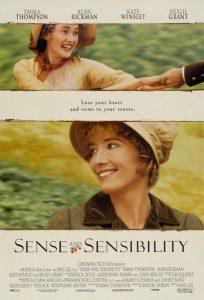
 Molly Weasley, Ron’s mother in the
Molly Weasley, Ron’s mother in the  While
While  I’ve
I’ve  The Dowager Countess may be one of my favorite characters overall in Julian Fellowes’ popular period drama, but as far as mothers go, Lady Grantham probably sets the best example in
The Dowager Countess may be one of my favorite characters overall in Julian Fellowes’ popular period drama, but as far as mothers go, Lady Grantham probably sets the best example in  Yes, I know she’s not the best mother, or even a good mother on many counts, but given all the times she made me laugh, there was no way I could leave Mrs. Bennet off this list. Throughout
Yes, I know she’s not the best mother, or even a good mother on many counts, but given all the times she made me laugh, there was no way I could leave Mrs. Bennet off this list. Throughout 
Recent Comments